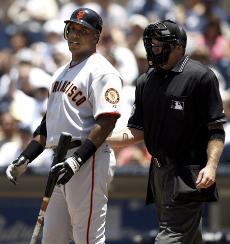Selig on drug policy: ‘It’s working’

Jul 12, 2006
PITTSBURGH – Major League Baseball Commissioner Bud Selig stuck up for baseball’s drug-testing program Tuesday and insisted the toughened policy is working, and later touched on recent scandals set off by Barry Bonds, Jose Canseco and Jason Grimsley.
“I really think steroid use has been minimized,” the commissioner said. “Amphetamines, we’re doing OK.”
Several hours before the All-Star game, Selig spoke on a variety of subjects with members of the Baseball Writers Association of America.
Yankee Stadium is a strong candidate to host the 2008 All-Star game in what is expected to be its final season, he hinted.
Selig said it was worth studying whether All-Star aces should be prohibited from pitching the Sunday before the event. He also frowned on Manny Ramirez skipping this year’s showcase – the Boston slugger backed out, citing a sore right knee.
Get The Daily Illini in your inbox!
“If you get voted onto the team, it’s a privilege. You ought to be here,” Selig said.
A year after Rafael Palmeiro tested positive for a banned substance and suspicion ran rampant, only one player has been penalized under Major League Baseball’s stricter steroid rules – New York Mets minor leaguer Yusaku Iriki. He was suspended 50 games; last season, he would have gotten a 10-day penalty.
“You don’t hear about it as much this year,” All-Star reliever Derrick Turnbow of Milwaukee said Monday. “Guys aren’t really talking about it.”
In 2003, Turnbow was the first major leaguer linked to steroids when he flunked a drug test at a U.S. Olympic training center. The players’ union said Turnbow had used androstenedione while the U.S. Anti-Doping Agency said it was a steroid.
“It was a black eye for the sport, what we went through,” said Toronto manager John Gibbons, a coach on the AL All-Star team. “You heard it everywhere. It was nonstop.”
This is the first year that amphetamines are banned. A first-time offender is sent to counseling, but his name is not made public. Selig declined to provide numbers, but said of the policy, “It’s working.”
“I’m happy where we are with the drug-testing program,” he said.
Selig said there was nothing new on the probe by former Senate Majority Leader George Mitchell into steroids.
“He’s very independent. I don’t hear from him,” Selig said.
While Mitchell investigates, a grand jury in San Francisco is looking into whether Bonds perjured himself when he testified to another grand jury in 2003 that he never knowingly took steroids or other banned performance-enhancing drugs.
Selig would not speculate on those court proceedings.
“That’s gone on a long time. I’m not going to guess anymore,” Selig said.





